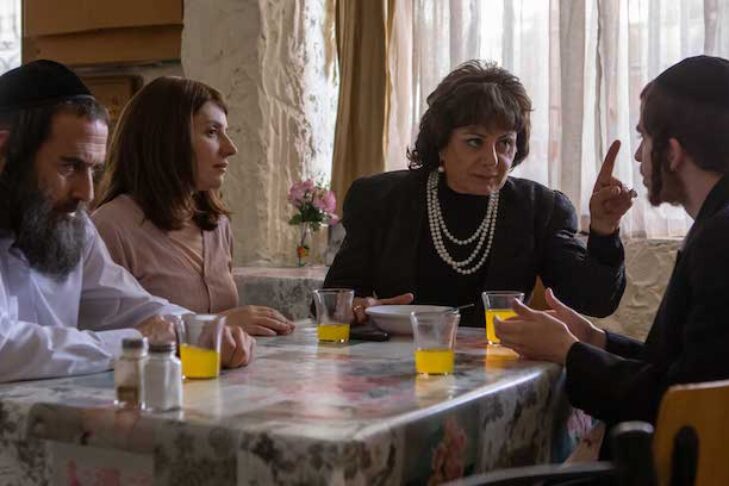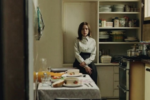As a feminist, an egalitarian Jew and someone who chafes at ironclad rules, there is pre-judgment—the root form of the word “prejudice”—on my part about the Haredi way of life. When I was younger, it was hard to watch a woman my age, who appeared to be stressed and unhappy, pushing a double stroller. In some ways, I saw that woman as serving a life sentence. But many years ago, when I got on the wrong bus in Jerusalem and ended up in a Haredi neighborhood, it was my turn to be pre-judged. I was wearing a sleeveless blouse and a skirt that grazed my bare legs, and a woman my age took it upon herself to rescue me. She had a gaggle of kids and held my arm, whispering to me to pretend that I was her secular cousin from America if anyone asked.
The day was a hot one, and just before putting me on the right bus, she told me how she envied me for not having to wear sleeves or stockings. At the time, I was single and verging on 30, and I suddenly thought how comforting for her to be certain that she would be a grandmother someday. Who needs spontaneity, dating and dull parties when you have the comfort of extended family and the peace of Shabbat?
My long-held fascination and albeit flickering admiration for the Haredi have ultimately helped me overcome my pre-judgments. Sometimes I even wonder if Judaism’s survival depends on Orthodoxy. After all, who else is interpreting preserving traditional Jewish observance to the letter of the law? But on the other hand, who wants to support a way of life that mostly excludes women from its rituals?
I seek out films and shows about ultra-Orthodox life to explore my questions and my doubts. But I’m usually disappointed with those depictions that frequently turn into soap operas or stall out as lackluster portrayals of the Haredi community. As compelling as Netflix’s “Unorthodox” was, it conveyed that a woman only attains true love and has great sex by rejecting religious constraints.
Enter “Shtisel,” Netflix’s breakout hit about four generations of an ultra-Orthodox family. From the beginning, it was immediately apparent that the show was a standout. Here were deep and interesting ultra-Orthodox Jews living lives of glorious messiness in Jerusalem’s Geula neighborhood.
We meet the Shitsels, who are still mourning their matriarch who died a year earlier. To add to the family’s burdens, their patriarch, Shulem Shtisel, has recently moved his mother to a nursing home. But in a surprising twist—and “Shtisel” has a few of those—she has access to a television for the first time in her life. It turns out she loves to watch reality television. Her summaries of the shows have a biblical arc that elevates them to an art form.
The show also centers on Akiva, played by the wonderful Michael Aloni. Akiva, or Kiva as he is known, is not just any dreamer; he is a gifted artist who instinctively sketches in secret. At 24, he’s almost aged out of making a good match in his community. Kiva’s sister, Giti—played to perfection by Neta Riskin—is a harried mother of five. She is married to Lippe, a butcher who thinks nothing of leaving her with the kids for an extended business trip to Argentina. When he goes rogue in South America, shaving his beard and cutting off his side curls as he takes up with a woman who isn’t Jewish, Giti is stoic. She endures Lippe’s betrayal, but she barely holds the family together. Credit for this family’s survival must also go to her teenage daughter Ruchami, splendidly portrayed by the luminous Shira Haas.
Ruchami reminds me of Rachel Benjamin, the protagonist in Pearl Abraham’s best-selling book, “The Romance Reader,” who also reads secular literature on the sly. Ruchami’s intense love of the classics slips out when she reads what she calls “Hannah Karenina” to her little brothers at bedtime.
Created by two men with insider knowledge and obvious affection for the Haredi community, “Shtisel” never exploits Orthodoxy for its seeming restrictiveness. The show is a notable departure from many depictions of ultra-Orthodoxy as it trains its lens on the pain, joys and sorrows of Haredi people alternately striving and struggling to live.
Father and son Shulem and Kiva often sit at their kitchen table late into the night, contemplating the universal problems that pierce their hermetic bubble. For example, there is Kiva’s controversial love for Elisheva, a widowed mother of one of Kiva’s young students in the yeshiva, where he tries to eke out a living teaching. At first glance, Shulem and Kiva may propel the show’s storyline, but it’s the women in this series who are in the driver’s seat.
The show’s drama occasionally has sitcom undertones. Situations are often resolved in a single episode. Sometimes there’s a slapstick feel to the family’s problems. Yet “Shtisel” doesn’t shy away from embracing serious themes of illness, depression and marital discord. If you close your eyes for a moment, you can almost imagine an insular society not so different from that of Jane Austen’s.
CBS Studios is reportedly developing an American remake of “Shtisel” with Kenneth Lonergan directing. But unlike the original, which firmly remains in the Haredi world, the CBS version will center on a secular, progressive 18-year-old woman who falls in love with an ultra-Orthodox man for whom she is willing to change her life.
“Shtisel,” which has won eight Ophir Awards—Israel’s equivalent in prestige and reach to the Academy Awards—is careful not to veer into voyeurism. Breaking away from Geula is a secular fantasy. And while the creators of “Shtisel” admit that the series was not originally created for Haredim—there are no televisions in most ultra-Orthodox households—it has achieved a cult-like status among a number of Haredi viewers. Episodes are shared illicitly. Shulem and Kiva are familiar friends. And with Passover beginning a couple days after the series’ third season debut, I would have loved to attend the Shtisel family’s seder.










